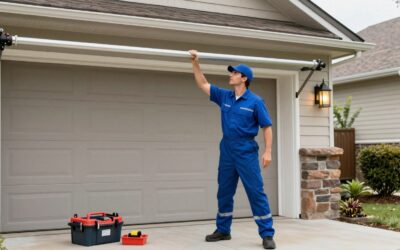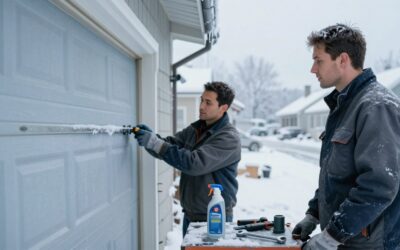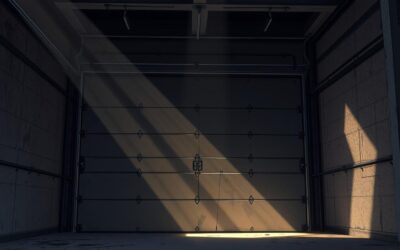Garage Door Repair: What Causes All That Noise?

Garage doors are essential to modern homes, providing security, convenience, and curb appeal. However, over time, garage doors can become a source of noise that ranges from mildly annoying to outright alarming. Understanding the root causes of this noise is crucial for maintaining the longevity of your garage door and ensuring the safety of its operation. In this article, we will explore the common causes of garage door noise, discuss the implications of each, and provide guidance on how to address these issues effectively.
1. Worn Out Rollers: A Common Culprit
Worn-out rollers are one of the most common reasons for garage door noise. The rollers are small wheels that guide the garage door along the tracks. Over time, these rollers can wear down, become misaligned, or accumulate debris, leading to a grating or grinding noise every time the door operates.
Types of Rollers and Their Impact on Noise
Metal Rollers: Metal rollers are durable but tend to be noisier compared to other materials. As they wear down, they can create a loud, clanking sound.
Nylon Rollers: Nylon rollers are quieter and smoother but may wear out more quickly than metal ones. When they degrade, they can produce a squeaking noise.
How to Address Roller Noise
To reduce or eliminate roller noise, consider upgrading to nylon rollers if you currently have metal ones. Additionally, regular lubrication of the rollers with a silicone-based lubricant can help reduce friction and noise. If the rollers are severely worn, it may be time to replace them altogether.
2. Misaligned Tracks: The Source of Grinding Sounds
Garage door tracks can become misaligned due to various factors, such as regular wear and tear, accidental bumps, or improper installation. When the tracks are not aligned correctly, the door may struggle to move smoothly, resulting in a grinding or scraping noise.
Identifying Misaligned Tracks
Misaligned tracks can often be identified by a visible gap between the rollers and the track, or if the door appears to be uneven when closed. In some cases, the door may also slow down or stick during operation.
Fixing Track Misalignment
To fix misaligned tracks, first, ensure the tracks are clean and free from debris. Then, loosen the screws that hold the tracks in place and gently tap them back into alignment using a rubber mallet. Once aligned, tighten the screws and test the door for smooth operation. If the problem persists, it may be best to consult a professional.
3. Loose or Damaged Hardware: The Source of Rattling Noises
Garage doors consist of various components held together by bolts, nuts, and screws. Over time, these pieces of hardware can become loose or even damaged, leading to a rattling noise whenever the door is in motion.
Common Hardware Issues
Loose Nuts and Bolts: The vibrations caused by regular operation can cause nuts and bolts to loosen, resulting in a rattling or clinking sound.
Worn Hinges: Hinges that are worn or damaged can also cause the door to rattle as it opens and closes.
Tightening and Replacing Hardware
Regular maintenance should include checking all the nuts, bolts, and screws on the garage door and tightening them as needed. If any parts are worn or damaged, they should be replaced immediately to prevent further issues.
4. Noisy Springs: Torsion and Extension Spring Problems
The springs of a garage door are under significant tension and play a crucial role in balancing the door’s weight. There are two main types of springs: torsion springs and extension springs, both of which can become noisy over time.
Torsion Springs
Torsion springs are mounted above the door and wind or unwind depending on the door’s movement. These springs can make a loud banging noise if they are broken or if they lose their tension.
Extension Springs
Extension springs are located on either side of the door and stretch or contract during operation. When these springs become worn or lose their elasticity, they can produce a loud popping or squeaking sound.
Spring Maintenance and Replacement
It is crucial to inspect garage door springs regularly for signs of wear and tear. Applying a lubricant specifically designed for springs can reduce noise. However, if a spring is damaged, it should be replaced immediately by a professional, as the tension in these springs makes them dangerous to handle without the proper tools and experience.
5. The Opener: Mechanical and Electrical Issues
The garage door opener is another potential source of noise. Depending on the type of opener, the noise can vary.
Chain-Drive Openers
Chain-drive openers are the most common and often the loudest. The metal-on-metal contact can create a loud, rattling noise, especially if the chain is loose or needs lubrication.
Belt-Drive Openers
Belt-drive openers are quieter, but if the belt becomes worn or misaligned, it can still produce noise.
Screw-Drive Openers
Screw-drive openers use a threaded rod to move the door. While generally quieter than chain drives, they can become noisy if the rod is not lubricated properly.
Maintaining the Opener
Regularly inspect the garage door opener for any signs of wear or misalignment. Lubricate all moving parts, including the chain or belt, and ensure that the opener is securely mounted to reduce vibration and noise. If the opener is old or excessively noisy, upgrading to a quieter model may be a worthwhile investment.
6. Insufficient Lubrication: The Overlooked Cause of Noise
Lubrication is essential for the smooth operation of a garage door. Without proper lubrication, the moving parts of the door can grind against each other, producing a variety of noises, from squeaking to grinding.
Areas to Lubricate
Rollers and Tracks: Apply a silicone-based lubricant to reduce friction.
Hinges and Springs: Use a lubricant specifically designed for these components to prevent squeaking and popping.
Opener Chain or Belt: Keep the chain or belt well-lubricated to ensure smooth operation.
Lubrication Schedule
For optimal performance, lubricate the garage door components every six months. Regular lubrication not only reduces noise but also extends the lifespan of the door.
7. Weather-Related Issues: Expansion and Contraction
Garage doors are exposed to the elements, and temperature changes can cause the door and its components to expand or contract. This expansion and contraction can lead to various noises, such as creaking or popping, especially during extreme weather conditions.
Weatherproofing Your Garage Door
To minimize weather-related noise, ensure that your garage door is properly insulated. Weatherstripping along the edges of the door can also help reduce noise by cushioning the impact as the door closes.
Dealing with Temperature Fluctuations
In areas with significant temperature changes, consider investing in a garage door designed to withstand extreme weather conditions. Regular maintenance, including checking for cracks or gaps in the door, can also help mitigate noise caused by expansion and contraction.
8. Age and Wear: When It’s Time for a New Garage Door
Sometimes, the noise from your garage door is simply a result of age and wear. Older doors may have multiple issues, such as worn-out rollers, loose hardware, or weakened springs, all contributing to increased noise levels.
Assessing the Condition of Your Garage Door
If your garage door is over 15 years old and has become increasingly noisy despite regular maintenance, it may be time to consider a replacement. Newer models are designed with noise reduction in mind and can offer a quieter, more efficient operation.
When Replacement is the Best Option
While repairs can address specific noise issues, a new garage door may be the most cost-effective solution in the long run, especially if the door is showing signs of significant wear and tear. A new door can improve not only the noise level but also the overall security and aesthetic of your home.
Conclusion
Noisy garage doors can be a nuisance, but they are often a sign of underlying issues that need attention. By understanding the causes of garage door noise, you can take the necessary steps to maintain your door and ensure its smooth, quiet operation. Regular maintenance, timely repairs, and considering an upgrade when necessary can help you keep your garage door in top condition for years to come.
Arrowhead Door Co will work hard on your garage door repair to reduce the noise and ensure a much smoother garage door operation.
Contact Us today Dial NOW 816-373-8228



